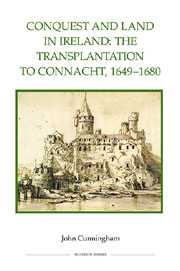Book contents
- Frontmatter
- Contents
- List of maps
- Acknowledgements
- Abbreviations
- Introduction
- 1 Conquest and land in Cromwellian Ireland, 1649–1652
- 2 Towards plantation and transportation, 1652–1654
- 3 The land settlement under threat, 1653–1655
- 4 Enforcing transplantation, 1655–1659
- 5 Transplantation in County Roscommon
- 6 The transplanters and the Restoration land settlement
- Conclusion
- Bibliography
- Index
3 - The land settlement under threat, 1653–1655
Published online by Cambridge University Press: 05 February 2013
- Frontmatter
- Contents
- List of maps
- Acknowledgements
- Abbreviations
- Introduction
- 1 Conquest and land in Cromwellian Ireland, 1649–1652
- 2 Towards plantation and transportation, 1652–1654
- 3 The land settlement under threat, 1653–1655
- 4 Enforcing transplantation, 1655–1659
- 5 Transplantation in County Roscommon
- 6 The transplanters and the Restoration land settlement
- Conclusion
- Bibliography
- Index
Summary
The approval in September 1653 of the legislation relating to the Irish land settlement saw an intensification of the efforts made by the various groups affected by it to protect and to enhance their prospects. The army and the adventurers both believed that their respective requirements for land should take precedence over all other demands. They would face stiff competition, however, from Irish Protestants and Catholics, both of which groups hoped to retain as much as possible of the land that they had held in 1641. Under the terms of the relevant legislation, both communities stood to lose a great deal. Only eight Protestants were exempted from pardon under the terms of the third qualification of the Act for the Settling of Ireland, and six of these were already dead or in exile by 1652. None the less, subsequent clauses in that act made many other Protestants liable to partial forfeiture of their estates. In May 1653 the Presbyterian Scots of east Ulster learned that their partial forfeitures were to be accompanied by transplantation to the south. For Catholic landowners the outlook was altogether bleaker by the autumn of 1653. In the aftermath of a long and complicated war, few of them could expect to meet the requirement of constant good affection necessary to avoid confiscation and transplantation to Connacht.
- Type
- Chapter
- Information
- Conquest and Land in IrelandThe Transplantation to Connacht, 1649-1680, pp. 48 - 73Publisher: Boydell & BrewerPrint publication year: 2011



